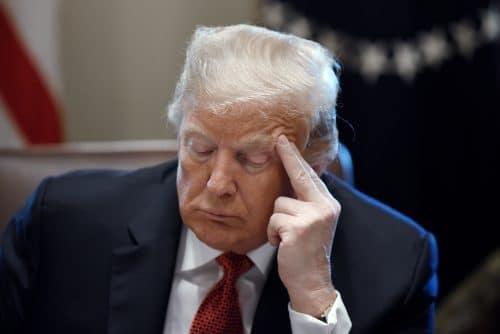The Truth About the Trump Economy
COMMENTARY

I keep hearing that although Donald Trump is a scoundrel or worse, at least he’s presiding over a great economy.
“The single biggest story this year is an economic boom that is durable and lasting,” White House economic adviser Larry Kudlow said recently.
Really? Look closely at the living standards of most Americans, and you get a very different picture.
Yes, the stock market has boomed since Trump became president. But it’s looking increasingly wobbly as Trump’s trade wars take a toll.
Over 80 percent of the stock market is owned by the richest 10 percent of Americans anyway, so most Americans never got much out of Trump’s market boom to begin with.
The trade wars are about to take a toll on ordinary workers. Trump’s steel tariffs have cost Ford about $1 billion so far, for example, forcing the automaker to plan mass layoffs.
What about economic growth? Data from the Commerce Department shows the economy at full speed, with 4.2 percent growth for the second quarter.
But very little of that growth is trickling down to average Americans. Adjusted for inflation, hourly wages aren’t much higher now than they were 40 years ago.
Trump slashed taxes on the wealthy and promised everyone else a $4,000 wage boost. But the boost never happened. That’s a big reason why Republicans aren’t campaigning on their tax cut, which is just about their only legislative accomplishment.
Trump and congressional Republicans refuse to raise the federal minimum wage, which is stuck at $7.25 an hour. Trump’s Labor Department is also repealing a rule that increased the number of workers entitled to time and a half for overtime.
Yes, unemployment is down to 3.7 percent. But jobs are less secure than ever. Contract workers — who aren’t eligible for family or medical leave, unemployment insurance, the minimum wage or worker’s compensation — are now doing one out of every five jobs in America.
Trump’s Labor Department has invited more companies to reclassify employees as contract workers. Its new rule undoes the California Supreme Court’s recent decision requiring that most workers be presumed employees unless proven otherwise. (Given California’s size, that decision had a nationwide effect.)
Meanwhile, housing costs are skyrocketing, with Americans now paying a third or more of their paychecks in rent or mortgages.
Trump’s response? Drastic cuts in low-income housing. His secretary of Housing and Urban Development, Ben Carson, wants to triple the rent paid by poor households in subsidized housing.
Health-care costs continue to rise faster than the rate of inflation. Trump’s response? Undermine the Affordable Care Act. Over the past two years, some 4 million people have lost health-care coverage, according to a survey by the Commonwealth Fund.
Pharmaceutical costs are also out of control. Trump’s response? Allow the biggest pharmacist, CVS, to merge with the one of the biggest health insurers, Aetna, creating a behemoth with the power to raise prices even further.
The cost of college continues to soar. Trump’s response? Make it easier for for-profit colleges to defraud students. Secretary of Education Betsy DeVos is eliminating regulations that had required for-profit colleges to prove they provide gainful employment to the students they enroll.
Commuting to and from work is becoming harder, as roads and bridges become more congested, and subways and trains older and less reliable. Trump’s response? Nothing. Although he promised to spend $1.5 trillion to repair America’s crumbling infrastructure, his $1.5 trillion tax cut for big corporations and the wealthy used up the money.
Climate change is undermining the standard of living of ordinary Americans, as more are hit with floods, mudslides, tornados, droughts and wildfires. Even those who have so far avoided direct hits will be paying more for insurance — or will have a harder time getting it. People living on floodplains, or in trailers, or without home insurance, are paying the highest price.
Trump’s response? Allow more carbon into the atmosphere and make climate change even worse.
Too often, discussions about “the economy” focus on overall statistics about growth, the stock market and unemployment.
But most Americans don’t live in that economy. They live in a personal economy that has more to do with wages, job security, commutes to and from work, and the costs of housing, health care, drugs, education and home insurance.
These are the things that hit closest home. They comprise the typical American’s standard of living.
Instead of an “economic boom,” most Americans are experiencing declines in all these dimensions of their lives.
Trump isn’t solely responsible. Some of these trends predated his presidency. But he hasn’t done anything to reverse them.
If anything, he’s made them far worse.
—
Robert Reich’s latest book is “The Common Good,” and his newest documentary is “Saving Capitalism.”
—
© 2018 By Robert Reich; Distributed by Tribune Content Agency, LLC
























